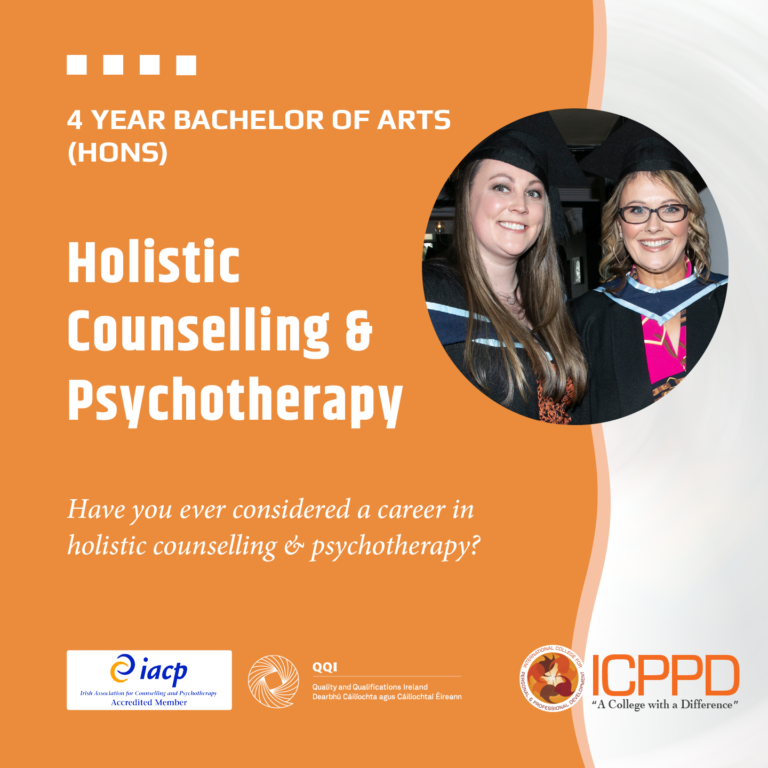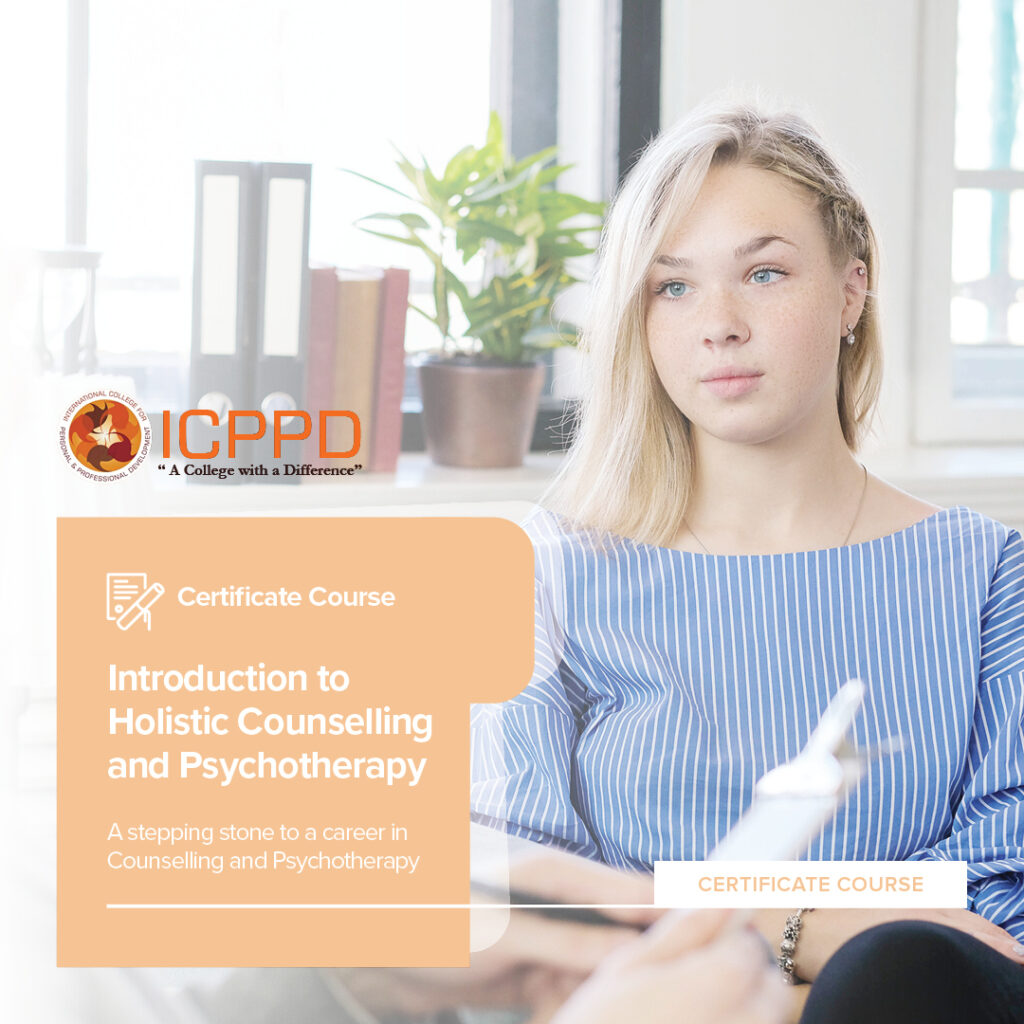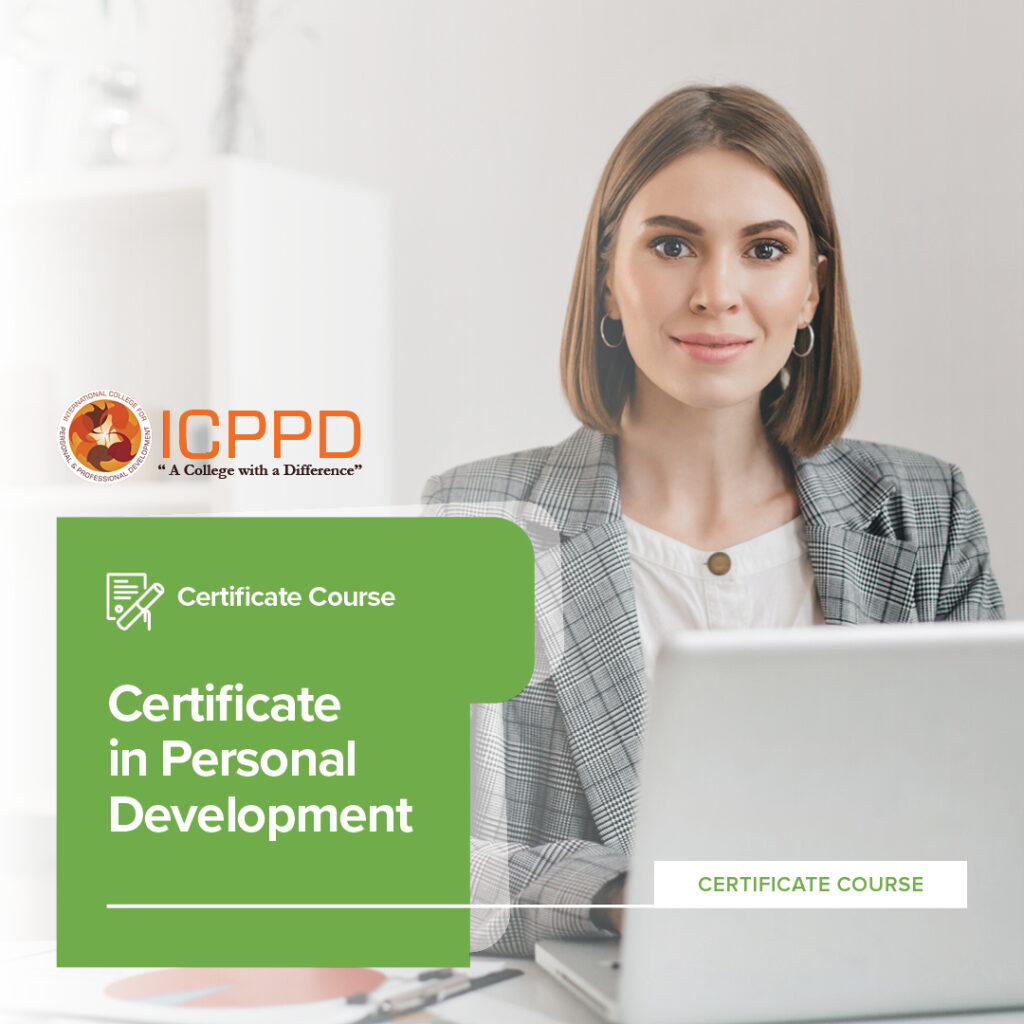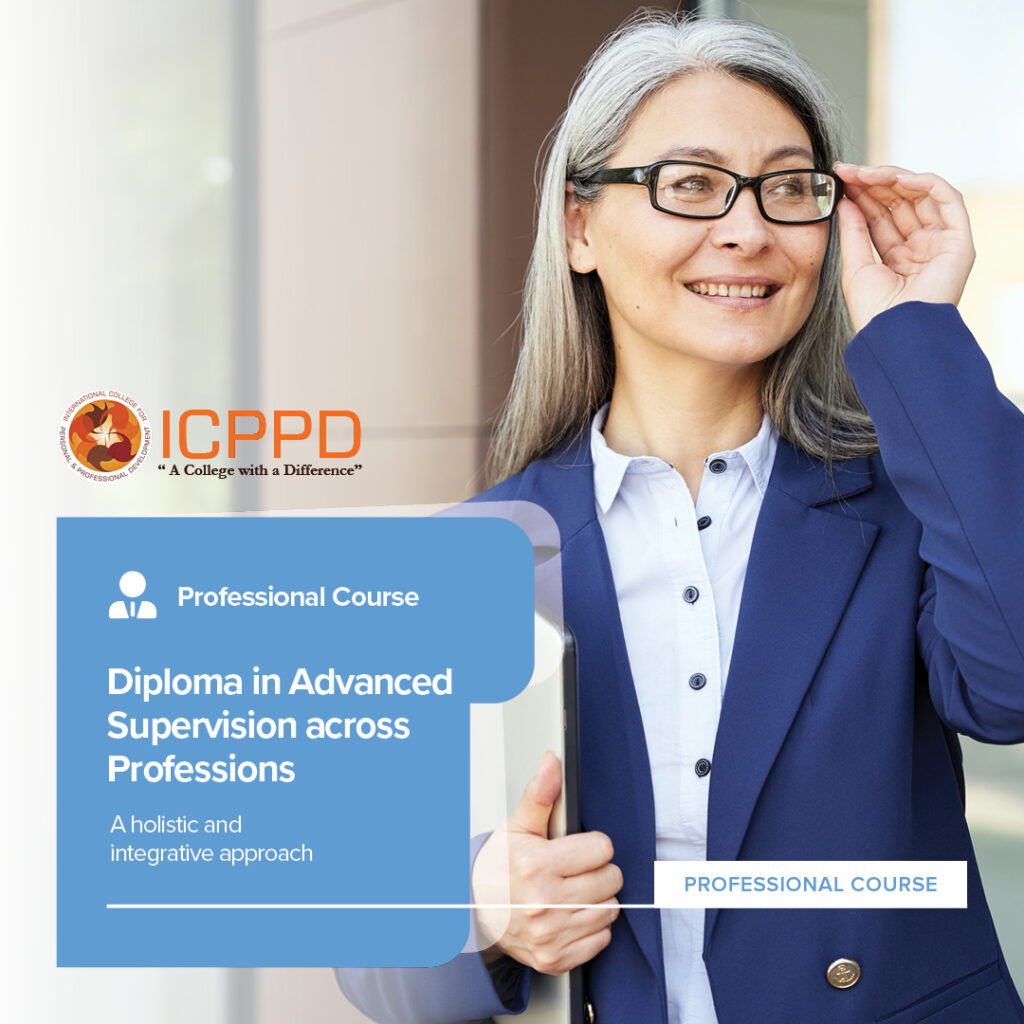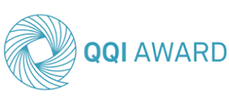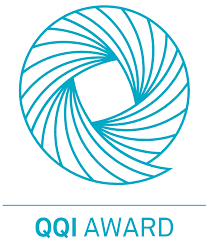
BACHELOR OF ARTS (Hons) in Holistic Counselling and Psychotherapy
Learn more at our next online information evening
Thursday June 15th from 7pm - 8pm
Venues
ATHLONE:
Coláiste Chiaráin, Summerhill, Athlone, Co. Westmeath, N37 AH97
GALWAY:
GCI House, Salthill, Co. Galway, H91 CDW4
DUBLIN:
Zest Life College, Earlscourt Industrial Estate, 1a Beaumont Ave, Churchtown Upper, Dublin 14. D14 E0F4
Commencement
September 2024.
Duration
4 Years, Part Time
Learning Outcomes
The programme aims and learning outcomes provide adult learners with the opportunity to explore and develop their interest in the field of holistic counselling and psychotherapy and to, thereby, develop into competent, compassionate, ethical, professional practitioners.
Schedule
Athlone and Galway:
Delivered every second weekend during the academic year; Saturday and Sunday (9.30am-5.00pm).
Clinical Practice support may be scheduled on a Friday evening.
Dublin:
The programme runs 1 midweek day every week during the academic year. Clinical Practice/In-house Supervision sessions may be scheduled for an alternative evening.
(10am – 5pm)
Contact [email protected] for further timetable information
Application
Entry is by submission of an Application Form and all applicants are subject to interview. All participants on this programme will be required to undertake National Vetting procedures (Form NVB1) prior to commencing their Clinical Practice. NOTE: Health screening may additionally be required.
Learner Protection
Learner protection for this programme is provided in accordance with Part 6 of the Qualifications and Quality Assurance (Education and Training) Act 2012
Course Fees
Fees for this programme are comparative to those for similar programmes delivered nationwide.
Course Fees: €4,300 per annum
Course Fees include –
Processing of Garda Vetting
Professional Insurance for clinical work as a
trainee counsellor/psychotherapist.
Fees may increase in line with consumer price index.
Please note that an additional QQI Certification Fee of €200 also applies in the final year Payment plan options are available for learners – please contact [email protected] for more information.
Interview Dates
Please contact [email protected] to enquire about other upcoming dates.
Additional Costs
Please note that there are also additional costs for mandatory associated programme activities.
Graduate Stories
In this short video hear what Oisin Moloughney a recent ICPPD graduate had to say about his experience as a student on the Bachelor of arts (Hons) in Holistic Counselling and Psychotherapy.
Programme Aims
The main aims of this 4-year, part-time, Level 8 Bachelor of Arts (Hons) in Holistic Counselling and Psychotherapy are to provide adult learners with the opportunity to explore and develop their interest in the field of holistic counselling and psychotherapy and to, thereby, become competent, compassionate, ethical, professional practitioners. At ICPPD, self-awareness is seen as vital to personal and professional development and is encouraged and promoted throughout this and all programmes offered.
Programme Objectives
The objectives of this 4-year Level 8 programme are to:
- Develop and expand the learner’s self-awareness, knowledge, skills and clinical experience through engagement with, and experiential immersion in, the programme
- Provide comprehensive education and training in the theory, skills and related therapeutic processes required for holistic counselling and psychotherapy practice
- Enable the learner to explore and deepen their knowledge of mental health issues, including addiction, and trauma-related matters, supported with an awareness of the complex ethical implications and good practice involved
- Introduce and broaden learner’s comprehension and experience of the use of creative processes and bodywork in holistic counselling and psychotherapy
- Promote evidence-based practice through robust research in the field of holistic counselling and psychotherapy
- Facilitate the learner in achieving relevant client work to meet requirements of theQQI Awards Standards – Counselling and Psychotherapy (2014)
- Persons who wish to embark on a career in counselling and psychotherapy
- Persons who are seeking a recognised academic qualification
- Those who have completed a course of study, or experienced profound personal insights, and yearn for greater knowledge, structure and experiences leading to a professional qualification
- Anyone seeking an integrated holistic understanding of the human condition, intimacy, and meaning in life
- Any person who wants to expand and deepen their communication skills to enhance their current professional and personal life
- Health professionals and human service providers such as doctors, complementary medical therapists, nurses, teachers, Gardaí, allied health professionals, ambulance officers, solicitors and others who are interacting with the public daily and wish to improve their interpersonal skills and self-awareness
- Those who seek a high level of skills which are effective in stimulating and supporting transformative change and community building
Entry Requirements
Application is limited to mature learners who have evidence of a minimum of ONE of the following:
- being a professional working in the field, or related disciplines
- being able to demonstrate a level of maturity of being able to reflect on their personal development experience (evidenced through a portfolio of prior learning, personal development, life experience, community work, etc)
- successful completion of an Introduction to Counselling and Psychotherapy programme, or equivalent
- successful completion of an Irish Leaving Certificate (with 5 O6/H7s (ord pass), including English and Maths), or equivalent.
Where English is the applicants second language, they must provide acceptable proof of English proficiency. The English language proficiency tests and scores which are considered acceptable for ICPPD programmes is 6.5 IELTS, or equivalent. (https://www.ieltsdublin.com/ )
Applicants are also required to have appropriate IT skills to facilitate their engagement with the programme and have a computer with internet access to facilitate some online delivery of programmes if scheduled.
ICPPD is responsible for ensuring learners’ ongoing Fitness to Practice, in terms of mental and physical health, behaviour and character. Therefore, progression through the programme is at the discretion of the College.
This programme supports participants to develop self-awareness, knowledge, skills and competencies of counselling and psychotherapy from an integrative perspective and is unique in its holistic/spiritual/creative focus.
The programme consists of the following modules:
Year 1
Learning to Learn
Personal Development
Introduction to Theory of Counselling and Psychotherapy
Person-Centred Approach
Counselling Skills and Practice
Lifespan Development and the Journey Principle
Holistic Approaches
Cognitive Behavioural Therapies
Group Process
Year 2
Gestalt Approach
Ethics and Legal Issues
Research Skills
Loss and Bereavement
Advanced Counselling Skills & Practice
Psychodynamic Perspectives
Group Process
Year 3
Psychosynthesis Psychotherapy
Abnormal Psychology and Mental Health issues
Family and Systemic Approaches
Professional Development
Research Methods
Group Process
Clinical Practice 1
Year 4
Humanistic and Integrative Psychotherapy
Trauma and Body Psychotherapy
Understanding Psychopathology
Research Project
Clinical Practice 2
The College reserves the right to amend the list of modules being offered on this programme.
Programme Delivery
ICPPD is committed to delivering our BA (Hons) in Holistic Counselling and Psychotherapy programme in an experiential classroom environment. The preferred mode of delivery is in face-to-face delivery however in compliance with and following guidance of IACP and QQI requirements, or in extraordinary circumstances, an online class environment may partially facilitate synchronous learning and the teaching and delivery of the programme.
Academic and Professional Requirements
In addition to meeting the academic requirements of the programme, learners are required to meet all of the relevant professional requirements, including those which determine fitness to practice.
Personal Therapy
Learners are required to have completed a minimum of 80 sessions of personal counselling with an acceptable accredited therapist during the 4 years of this programme. A minimum of 20 hours in each academic year is required and a minimum of 40 sessions of which must be completed before clinical work commences.
Note: An additional fee is payable by the learner for personal therapy (to the therapist).
Supervision
During Clinical Practice, learners are required to complete 1 hour of supervision for every 5 hours of client work, with a minimum of 1 supervision session/month.
By the end of year 4, learners are required to have completed a minimum of 24 supervision hours and 1-hour initial consultation with an acceptable accredited external supervisor.
ICPPD also provides in-house group supervision, as required by the relevant professional bodies.
Note: An additional fee is payable by the learner for supervision (to their external clinical supervisor).
Additional (Integrated) Personal Development
During the programme, learners are invited to lead mini reflections/retreats as part of their creative and spiritual development. Throughout the first 3 years of the programme learners participate in, and experience group process as part of their personal and professional development.
Integration Retreat Day
A mandatory Integration retreat day will be secluded at the end of year 4. This will encore an additional fee.
Clinical Placement
From the beginning of year 3 to the end of year 4, learners are required to have completed 120 client sessions, under supervision in a suitable placement, and meet all other modules’ requirements. ICPPD provides Insurance cover for learners while on Clinical Practice as part of their programme. As part of, and to support Clinical Practice ICPPD provides In-House Supervision, with an accredited supervisor, as required by IACP/professional bodies.
Research Supervision
ICPPD provides external research supervision to learners in year 4, during the Research Module.
Registration with Professional Bodies
Successful completion of the programme does not equate to professional registration. It is recommended to prospective learners that they check the criteria of any professional body to which they may wish to seek future accreditation
This IACP link illustrates the route to professional accreditation and membership of IACP (Irish Association for Counselling and Psychotherapy) – https://www.iacp.ie/accredited-membership-iacp.
The experiential environment and holistic focus of this programme support academic frameworks and theoretical input. The programme and individual module learning outcomes are achieved through the following learning and teaching methodologies:
- Class Presentations
- External Clinical Supervision
- In-House Group Supervision
- Class Presentations
- Clinical Practice
- Creative Portfolios
- Creative Projects/Exercises
- Discussion Groups
- Dream Journal
- Workshops – Dream Work – Active Imagination – Genograms – Body Work – Creative Arts Practice
- DVD-Recorded Skills Practice
- Skills Practice Dyads/Triads
- Essays
Academic Resources
ICPPD uses Moodle, a virtual learning environment (VLE), to disseminate class material and share course-related resources, as well as news, assignment details, discussion fora, etc.
The College also provides access to EBSCO e-Library, e-Journal and other resources through Moodle. These resources facilitate the support of learners at outreach centres, and through out-of-hours times.
Learners will be shown how to access these facilities at their Induction session and in the first module of Year 1.
Academic Writing Workshops
Academic Writing Workshops are provided free of charge at the commencement of the Academic Year covering areas including Academic Writing Conventions, Critical Thinking, Formatting and Presentation, Referencing, use of Moodle and Library facilities.
Assessment Strategies for this programme include:
- Keeping a reflective journals during the programme, creative portfolios.
- Written essays, assignments, reports and reflective pieces on topics related to the holistic counselling and psychotherapy theory and skills presented.
- Role-playing and scenarios demonstrating your holistic counselling and psychotherapy skills.
- Ongoing and continuous assessment by programme lecturer.
- Examination of one module in year 2 through a formal two-hour examination.
- Development of a Research Project
This Bachelor of Arts (Hons) in Holistic Counselling and Psychotherapy, 4-year, NFQ-Level 8 programme – 240 ECTS – is validated by Quality and Qualifications Ireland (QQI) and accredited by IACP.
NOTE: Learners who successfully complete the first year of the programme and no longer wish to continue their studies on this programme may apply for an exit award of Certificate in Holistic Counselling and Psychotherapy (60 ECTS, part-time, Level 6, Minor (exit) Award).
National Award Standards – Counselling and Psychotherapy
In 2014 Quality and Qualifications Ireland (QQI published Award Standards for programmes leading to qualifications in Counselling & Psychotherapy at varying levels of the National Framework of Qualifications.
The publication of these standards represents the most significant development in terms of the professionalization of Counselling and Psychotherapy in recent years. Most of the Professional Associations in Counselling & Psychotherapy in Ireland agreed in 2008 that Degree and Masters level qualifications will be the future minimum requirements for entry to the practice of Counselling & Psychotherapy. These recommendations are likely to inform the standards which will apply when Counselling & Psychotherapy become regulated by CORU, and the titles of Counsellor and Psychotherapist become protected in law.
“People are just as wonderful as sunsets if you let them be. When I look at a sunset, I don't find myself saying, "Soften the orange a bit on the right hand corner." I don't try to control a sunset. I watch with awe as it unfolds.”
Carl R. Rogers, A Way of Being
“The add on year 4 has been a wonderful experience, ICPPD provided a space to deepen, explore and develop from the core training. The modules integrate both experiential and academic learning, linking the theory to the lived experience beautifully. The tutors all bring their own style of teaching and each module encourages creativity in how we learn, meeting the different needs in the group. My learning has been rich with the environment encouraging and welcoming diversity, experience and perspectives. Personally and professionally I will leave this year in gratitude and abundance; friends, learning, connection, creativity.”
Olivia Feehan, 1 year add-on, Bachelor of Arts (Hons) in Holistic Counselling and Psychotherapy, 2018/2019.
Since its foundation, ICPPD has taken the steps necessary to ensure the delivery of a quality service in an environment that is characterised by an attitude to adult learners that is supportive and encouraging. We aim to provide an experience of learning that will develop in learners a hunger for both heart-centred wisdom and critical analysis. Our programmes are designed to be participative, experiential and to draw whenever possible on prior lived experience. The programme’s academic value is enhanced by a learning environment that is warm, vibrant, and genuine. Learners and staff interact in a mutual effort to engage in and promote the concept of lifelong learning. ICPPD’s holistic ethos underpins all interaction. This programme has been designed and is delivered, by staff who are passionate and inspired about the merit of personal development and excellence in professional counselling and psychotherapy training and education.

ICPPD reserves the right to cancel, suspend or modify in any way the matters contained in this publication.
The College reserves the right to amend the list of modules being offered for any programme.
- +353(0)906470484
- [email protected]

Bachelor of Arts (Honours) in Holistic Counselling and Psychotherapy
Now accepting applications
Credits: 240 ECTS
Award: Bachelor of Arts (Hons) in Holistic Counselling and Psychotherapy
Venues:
Athlone – Coláiste Chiaráin, Summerhill, Athlone, Co. Westmeath, N37 AH97
Galway – Galway Business School, GCI House, Salthill, Co. Galway, H91 CDW4
Dublin – Zestlife, Earlscourt Industrial Estate, 1a Beaumont Avenue, Churchtown Upper, Dublin 14, D14 E0F45
Commencement: September 2024
Duration: 4 Years, part-time
Course Fee: €4,400* per annum. Payment plan options are available for learners – please contact [email protected] for more information.
Our Next Online Information Evening for this Course is 18/07/2024
ICPPD’s Quality Assurance policies
ICPPD attracts people who appreciate a holistic perspective (link to new page) to helping and healing. Courses at ICPPD are person-centred and holistic with emphasis on creativity and scholarly activity. As more clients of today seek a holistic approach to matters of health and well-being, the ICPPD graduate practitioner of this programme will be well-placed to meet this emerging need.
This BA (Honours) in Holistic Counselling and Psychotherapy programme is rooted in the humanistic tradition and the focus is on meeting the learner on a physical, cognitive, emotional, spiritual and behavioural level.
It will appeal to people who wish to pursue a career as professional counsellors and psychotherapists, or for those who have an opportunity to use counselling skills as part of their work. The programme is for a variety of professionals who wish to augment and build upon previous training. It is also suitable for life-long learners or second-chance learners returning to education in adult life.
- Persons who wish to embark on a career in counselling and psychotherapy
- Persons who are seeking a recognised , accredited academic qualification
- Those who have completed a course of study, or experienced profound personal insights, and yearn for greater knowledge, structure and experiences leading to a professional qualification
- Anyone seeking a holistic understanding of the human condition, intimacy, and meaning in life
- Any person who wants to expand and deepen their communication skills to enhance their current professional and personal life
- Health professionals and service providers such as doctors, complementary medical therapists, nurses, teachers, Gardaí, allied health professionals, ambulance officers, solicitors and others who are interacting with the public daily and wish to improve their interpersonal skills and self-awareness
- Those who seek a high level of skills which are effective in stimulating and supporting transformative change and community building
Programme Aims
The main aims of this 4-year, Bachelor of Arts (Honours) in Holistic Counselling and Psychotherapy (NFQ Level 8) are to provide adult learners with the opportunity to explore and develop their interest in the field of holistic counselling and psychotherapy and to, thereby, become competent, compassionate, ethical, professional practitioners. At ICPPD, self-awareness is seen as vital to personal and professional development and is encouraged and promoted throughout this and all programmes offered.
Programme Objectives
The objectives of the programme are to:
- Develop and expand the learner’s self-awareness, knowledge, skills and clinical experience through engagement with, and experiential immersion in, the programme
- Provide comprehensive education and training in the theory, skills and related therapeutic processes required for holistic counselling and psychotherapy practice
- Enable the learner to explore and deepen their knowledge of mental health issues, including addiction, and trauma-related matters, supported with an awareness of the complex ethical implications and good practice involved
- Introduce and broaden learners’ comprehension and experience of the use of creative processes and bodywork in holistic counselling and psychotherapy
- Promote evidence-based practice through robust research in the field of holistic counselling and psychotherapy
- Facilitate the learner in achieving relevant client work to meet requirements of the QQI Awards Standards – Counselling and Psychotherapy (2014)
Learning outcomes:
The learning outcomes for the programme have been devised to reflect the needs of target learners in terms of their expectations in acquiring the knowledge, skill and competence to enter the counselling and psychotherapy profession while also meeting the professional requirements of the accrediting professional body ensuring that on completion of the programme, graduates have the requirements to pursue professional accreditation routes. IACP Accredited Membership Route).
Syllabus:
This programme supports participants to develop self-awareness, knowledge, skills and competencies of counselling and psychotherapy from a person-centred perspective and is unique in its holistic, spiritual, creative focus.
The programme consists of the following modules:
Year 1
Learning to Learn
*Personal Development
Introduction to Theory of Counselling and Psychotherapy
*Person-Centred Approach
Counselling Skills and Practice
Lifespan Development and the Journey Principle
*Holistic Approaches
Cognitive Behavioural Approaches
Group Process
Year 2
*Gestalt Approach
Ethics and Legal Issues
Research Skills
Loss and Bereavement
Advanced Counselling Skills
*Psychodynamic Perspectives
Group Process
Year 3
*Psychosynthesis Psychotherapy
Abnormal Psychology and Mental Health issues
Family and Systemic Processes
Professional Development
Research Methods
Group Process
Clinical Practice 1
Year 4
*Humanistic and Integrative Psychotherapy
*Trauma and Body Psychotherapy
Understanding Psychopathology
Research Project
Clinical Practice 2
*The holistic focus is emphasised in these modules across the four-year programme.
ICPPD reserves the right to amend the list of modules being offered on this programme.
Programme Delivery
ICPPD is committed to delivering the BA (Honours) in Holistic Counselling and Psychotherapy programme in an experiential classroom environment. The preferred mode of delivery is in face-to-face delivery however in compliance with and following guidance of IACP and QQI requirements, or in extraordinary circumstances, an online class environment may partially facilitate synchronous delivery of the programme.
Award:
This Bachelor of Arts (Honours) in Holistic Counselling and Psychotherapy, 4-year, NFQ Level 8 programme ( 240 ECTS) is validated by Quality and Qualifications Ireland (QQI) and accredited by IACP.
NOTE: Learners who successfully complete the Year 1 of the programme and who no longer wish to continue their studies on this programme may apply for an exit award of Certificate in Holistic Counselling and Psychotherapy, 60 ECTS, NFQ Level 6, Minor Award.
Learning & Teaching Strategies:
The experiential environment and holistic focus of this programme support academic frameworks and theoretical input. The programme and individual module learning outcomes are achieved through varied learning and teaching methodologies for example:
- Class Presentations
- Holistic Reflections
- External Clinical Supervision
- In-House Group Supervision
- Creative Portfolios /Projects/Exercises
- Discussion Groups
- Journalling
- Workshops – Dream Work – Active Imagination – Genograms – Body Work – Creative Arts Practice
- Recorded Skills Practice
- Skills Practice in Dyads/Triads
- Formal and informal Feedback
- External Academic Research Supervision
- Group Exercises
- Reflective Practice
- Independent Learning
- Modelling/Demonstration by Lecturer
- Reflective Journaling
- Reports
- Research
- Role Play
- Study Groups
Assessment Strategies:
Assessment Strategies for this programme include:
- Keeping reflective journals during the programme
- Creative portfolios.
- In-class Presentations
- Written essays, assignments, reports and reflective pieces.
- Role-playing and scenarios demonstrating holistic counselling and psychotherapy skills.
- Ongoing and continuous formative assessment by tutors
- Development of a Research Project
Academic Resources
ICPPD uses Moodle, a virtual learning environment (VLE), to disseminate class material and share course-related resources, as well as news, assignment details, discussion fora, etc.
The College also provides access to EBSCO e-Library, e-Journal and other resources through Moodle. These resources facilitate the support of learners at outreach centres, and through out-of-hours times.
Learners will be shown how to access these facilities at their Induction session and in the first module of Year 1.
Zoom is the platform used for delivery of virtual synchronous classes.
Academic Writing Workshops
Academic Writing Workshops are provided free of charge at the commencement of the Academic Year covering areas including Academic Writing Conventions, Critical Thinking, Formatting and Presentation, Referencing, use of Moodle and accessing Library facilities.
Admission Criteria:
Entry Requirements
Application is limited to mature learners who have evidence of a minimum of ONE of the following:
- being a professional working in the field, or related disciplines
- being able to demonstrate a level of maturity of being able to reflect on their personal development experience (evidenced through a portfolio of prior learning, personal development, life experience, community work, etc)
- successful completion of an Introduction to Counselling and Psychotherapy programme, or equivalent
- successful completion of an Irish Leaving Certificate (with 5 O6/H7s (ord/ pass), including English and Maths), or equivalent.
Where English is the applicants second language, they must provide acceptable proof of English proficiency. The English language proficiency tests and scores which are considered acceptable for ICPPD programmes is 6.5 IELTS, or equivalent. (https://www.ieltsdublin.com/ )
Applicants are also required to have appropriate IT skills to facilitate their engagement with the programme and have a computer with internet access to facilitate completion of assessments and some online delivery of programmes if scheduled.
ICPPD is responsible for ensuring learners’ ongoing Fitness to Practice, in terms of health, behaviour and character. Therefore, progression through the programme is at the discretion of the College.
Application:
Entry is by submission of an Application Form (link) and all applicants are subject to interview. All participants on this programme will be required to undertake National Vetting procedures (Form NVB1) prior to commencing their Clinical Practice.
NOTE: Health screening may additionally be required.
Academic and Professional Requirements
In addition to meeting the academic requirements of the programme, learners are required to meet all of the relevant professional requirements, including those which determine fitness to practice.
Personal Therapy
Learners are required to have completed a minimum of 80 sessions of personal counselling with an acceptable accredited therapist during the 4 years of this programme. A minimum of 20 hours in each academic year is required and a minimum of 40 sessions of which must be completed before clinical work commences.
Note: An additional fee is payable by the learner for personal therapy (to the therapist).
Supervision
During Clinical Practice, learners are required to complete 1 hour of supervision for every 5 hours of client work, with a minimum of 1 supervision session/month.
By the end of year 4, learners are required to have completed a minimum of 24 supervision hours and 1-hour initial consultation with an acceptable accredited external supervisor.
Note: An additional fee is payable by the learner for supervision (to their external clinical supervisor).
ICPPD also provides in-house group supervision, as required by the professional accrediting body (IACP).
Additional Integrated Personal Development
During the programme, learners are invited to participate in and lead mini reflections/retreats as part of their creative and spiritual development. Throughout the first 3 years of the programme learners participate in, and experience group process as part of their personal and professional development.
Integration Retreat Day
A mandatory Integration retreat day will be secluded at the end of year 4. This will incur an additional fee which will be advised during Year 4.
Clinical Placement
From the beginning of Year 3 to the end of Year 4, learners are required to have completed 120 client sessions, under supervision in a suitable placement. ICPPD provides Professional Indemnity Insurance cover for learners while on Clinical Practice as part of the programme. As part of, and to support, Clinical Practice ICPPD provides In-House Supervision, with an accredited supervisor, as required by IACP/professional bodies.
Research Supervision
ICPPD provides external research supervision to learners in Year 4, during the Research Module.
Protection of Enrolled Learners
QQI only validates programmes of education or training where a provider has met specific conditions and criteria. One of these conditions relates to arrangements for the protection of enrolled learners. Protection of Enrolled Learners (PEL) aims to safeguard a learner’s academic journey. ICPPD provides learner protection for this programme by financial bonding, in accordance with Part 6 of the Qualifications and Quality Assurance (Education and Training) Act 2012
IACP Accreditation
Registration with Professional Bodies
Successful qualification from the programme does not equate to professional registration. It is recommended that prospective learners check the criteria of any professional body to which they may wish to seek future accreditation.
This IACP link illustrates the route to professional accreditation and membership of IACP (Irish Association for Counselling and Psychotherapy) – https://www.iacp.ie/accredited-membership-iacp.
QQI Validation
National Award Standards – Counselling and Psychotherapy
In 2014 Quality and Qualifications Ireland (QQI published Award Standards for programmes leading to qualifications in Counselling & Psychotherapy at varying levels of the National Framework of Qualifications.
The publication of these standards represents the most significant development in terms of the professionalization of Counselling and Psychotherapy in recent years. Most of the Professional Associations in Counselling & Psychotherapy in Ireland agreed in 2008 that Degree and Masters level qualifications will be the future minimum requirements for entry to the professions of Counselling & Psychotherapy. These recommendations are likely to inform the standards which will apply when Counselling & Psychotherapy become regulated by CORU, and the titles of Counsellor and Psychotherapist become protected in law.
Award:
This Bachelor of Arts (Honours) in Holistic Counselling and Psychotherapy, 4-year, NFQ-Level 8 programme – 240 ECTS – is validated by Quality and Qualifications Ireland (QQI) and accredited by IACP.
“People are just as wonderful as sunsets if you let them be. When I look at a sunset, I don't find myself saying, "Soften the orange a bit on the right hand corner." I don't try to control a sunset. I watch with awe as it unfolds.”
Carl R. Rogers, A Way of Being
What Our Learners Say
Who better to tell you about the college than the learners themselves
Contact Us
- +353(0)9064 70484
- [email protected]
-
Magazine Road, Athlone, Co. Westmeath,
N37Y5F6
Sign up for our Newsletter
Disclaimer: ICPPD reserves the right to cancel, suspend or modify in any way the matters contained in this publication. Privacy Policy
